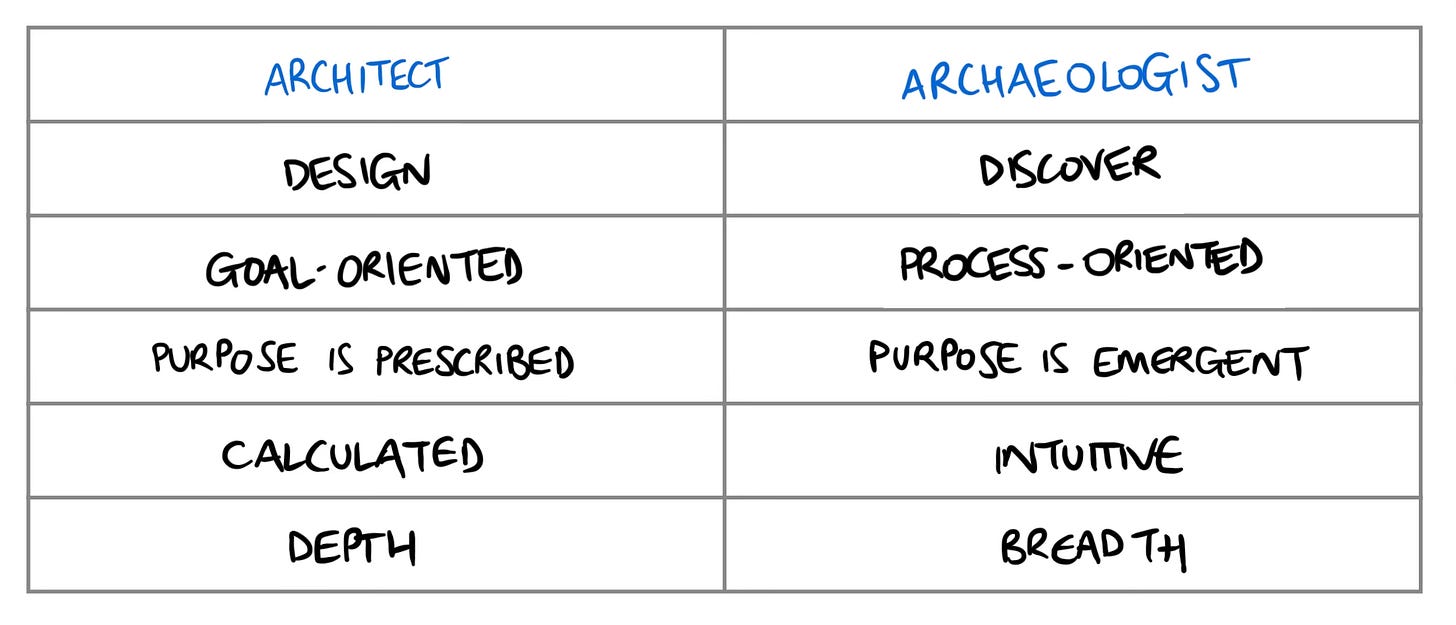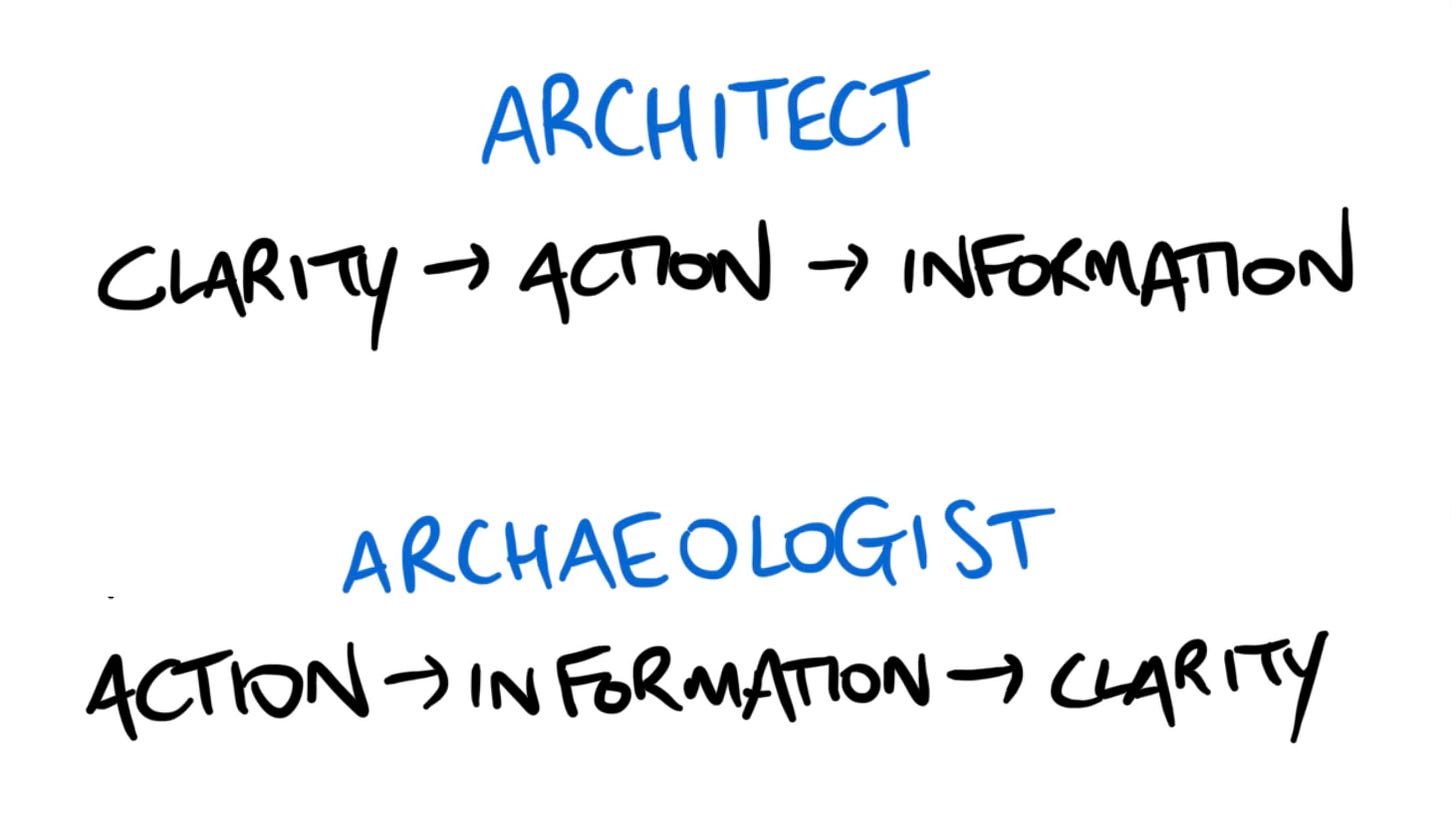Knowing it all vs. figuring it out
The Architect vs. Archaeologist framework you didn't know you needed
I’m 1 year and 10 months into my breakup with the idea that I need to have things figured out before I take action, and I’ve never been more productive, more fulfilled, more aligned and less anxious in my entire life.
I used to think that creating something from nothing required a perfect idea with a perfect strategy, and a perfectly executed perfect plan. I built an entire Project Management career around this thesis and my ability to strategise, identify opportunities, set goals, meticulously map out steps, create timelines and identify risks. And while this methodology might have been an asset when I worked in big companies, it became hugely limiting when I entered startup and self-employment land where literally nothing goes to plan and everything is built on the fly.
I’ll be real, it’s an almost-Christmas miracle that over the past 1 year and 10 months my Type A personality has been able to amputate the need for certainty and control, and replace it with a sense of playful exploration. And this whole heart, mind and body shift was catalysed after hearing one simple idea.
The Architect vs. the Archaeologist
Before we dive in I must give a huge shoutout where a shoutout is due: David Perell taught me this framework during Write of Passage, his writing course which has recently (and sadly) closed its doors.
There are two ways to think about building anything in life, whether it be your (portfolio) career, business, personal brand, product or service, writing habit, creative muscle or anything else. You can take the planned, methodical approach of an Architect or the unplanned, exploratory approach of an Archaeologist.
The Architect
The Architect has a crystal clear vision of what they want to build. They see a minimalist Scandi house and its four pine walls in their mind’s eye and document a detailed set of drawings to make their aesthetic dream come true. They’re intentional from the get-go. Goal-oriented. Singularly focused. They are a person with a purpose and a plan.
Architects in action:
Writing/Personal Brand: they know what they want to write about. They have a core message and build their platform around it from post #1. They pick a niche and talk about it day in, day out. They make a big bet and hope that it resonates with others.
Portfolio Careers: they’re clear on the portfolio they want to build. They understand who they serve, what they offer and how they add value. They have strategy for diversification and a relentless focus for bringing it to life.
Business: they define their target customer and their value prop, map out an offering and flesh out their sales and marketing strategies. They have clear financial goals and milestones. They optimise for efficiency. They build it and hope people will come.
The Archaeologist
The Archaeologist doesn’t have a clear vision but they have a commitment to uncovering the truth. They figure out where they’re going while they’re going. They don’t design, they discover. Their purpose isn’t prescribed, it’s emergent. They forget goals and commit to the process. They dig for aligned opportunities and then build what others (and they) need.
Archaeologists in action:
Writing/Personal Brand: they don’t know what they want to write about, and instead write to figure it out. They refuse to pick a niche for niche’s sake. Each published piece is an experiment and they listen for signals to understand what resonates. They explore. They test. They fuck around and find out.
Portfolio Careers: they accept that they’re multifaceted humans and that their career probably won’t follow a blueprint. They tinker with everything - their positioning, message, service offering, products, rates - and adjust based on real time data and feedback. They pivot once. They pivot twice. They only commit to a pathway when it’s validated and feels right.
Business: they’re all about the lean methodology, the prototype and the MVP. They’re not deluded enough to think that just because they build it, people will come. They believe in creating something people want, when they want it, and how they need it.
99% of people think that to be successful you must be an architect, but ironically only about 1% of people are architects and 99% of people are archaeologists. That’s because it’s difficult to have clarity before you start gathering information (the architect approach) and it’s much easier to gain clarity once data flows in (the archaeologist approach).
When I realised that I was a classic archaeologist, everything changed. I stopped telling myself bullshit stories about not being able to start this newsletter because I didn’t have a ‘niche’ or a ‘cool brand’ or a ‘unique concept’ or an ‘edge’. I stopped needing to answer the question ‘what am I going to do now I’m no longer a founder?’. I stopped needing to know and started pressing go.
If you’re wondering whether you’re an architect or archaeologist, you’re an archaeologist (sorry to break it to you). And as a student of discovery it isn’t your job to conceptualise a dream and spend endless hours planning how to make it real. It’s your job to get curious. It’s your job to explore. It’s your job to ship work, put imperfect ideas in front of others, seek feedback, iterate and move. Because your life’s work isn’t proudly displayed for you and everyone else to see. It’s beneath you, struggling to find the light.
If you’re feeling clueless it’s because you haven’t yet started searching for clues. So stop planning. Start excavating.
Dig.
The clueless Archaeologist to clued-in Architect pipeline (aka. my writing / business building journey over the last 2 years):
❤️🔥 Subscribe for more ideas and frameworks…
…to help you build a financially lucrative and creatively fulfilling portfolio career and life.









Yes yes yessss.
I’m also an archaeologist and the hardest part for me is not being able to package neatly. It drives me insane. Would someone want to read a piece about choice one week, marketing campaigns the next and why goth boots are now mainstream two weeks after that, by way of a story about vomit phobia? IDK, let’s find out.
wow, loved this! I too have been struggling to start my substack because I don’t have an exact plan, but have decided to go for it regardless and pivot when needed. this post resonated heavily!